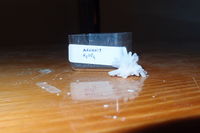Difference between revisions of "Potassium sulfate"
From Sciencemadness Wiki
(Created page with "{{Chembox | Name = Potassium sulfate | Reference = | IUPACName = Potassium sulfate | PIN = | SystematicName = | OtherNames = {{Unbulleted list | ''name1'' | ''name2'' .....") |
|||
| Line 12: | Line 12: | ||
}} | }} | ||
<!-- Images --> | <!-- Images --> | ||
| − | | ImageFile = | + | | ImageFile = File:K2 SO4.jpg| ImageSize = |
| − | | ImageSize = | + | |
| ImageAlt = | | ImageAlt = | ||
| ImageName = | | ImageName = | ||
Revision as of 14:58, 24 January 2016

| |
| Names | |
|---|---|
| IUPAC name
Potassium sulfate
| |
| Properties | |
| K2SO4 | |
| Molar mass | 174.259 g/mol |
| Density | 2.66 g/cm3 |
| Melting point | 1,069 °C (1,956 °F; 1,342 K) |
| Boiling point | 1,689 °C (3,072 °F; 1,962 K) |
| 111 g/L (20 °C) 120 g/L (25 °C) 240 g/L (100 °C) | |
| Except where otherwise noted, data are given for materials in their standard state (at 25 °C [77 °F], 100 kPa). | |
| Infobox references | |
Potassium sulfate (K2SO4) or potassium sulphate, also known as arcanite, sulphate of potash or potash of sulfur is a soluble potassium salt of sulfuric acid.
Contents
Properties
Chemical
Potassium salt will react with sulfuric acid to form potassium bisulfate.
Physical
Potassium sulfate is a white odorless solid, with a biter taste. It is soluble in water, slightly soluble in glycerol, but insoluble in acetone, carbon disulfide, ethanol.
Availability
Potassium sulfate is available as a fertilizer, either pure or mixed with other materials.
Preparation
Can be prepared by reacting potassium carbonate with sulfuric acid.
Projects
- Make potasium nitrate
Handling
Safety
Potassium sulfate has little toxicity, though it be irritant.
Storage
In closed bottles.
Disposal
Can be safely dumped in soil.